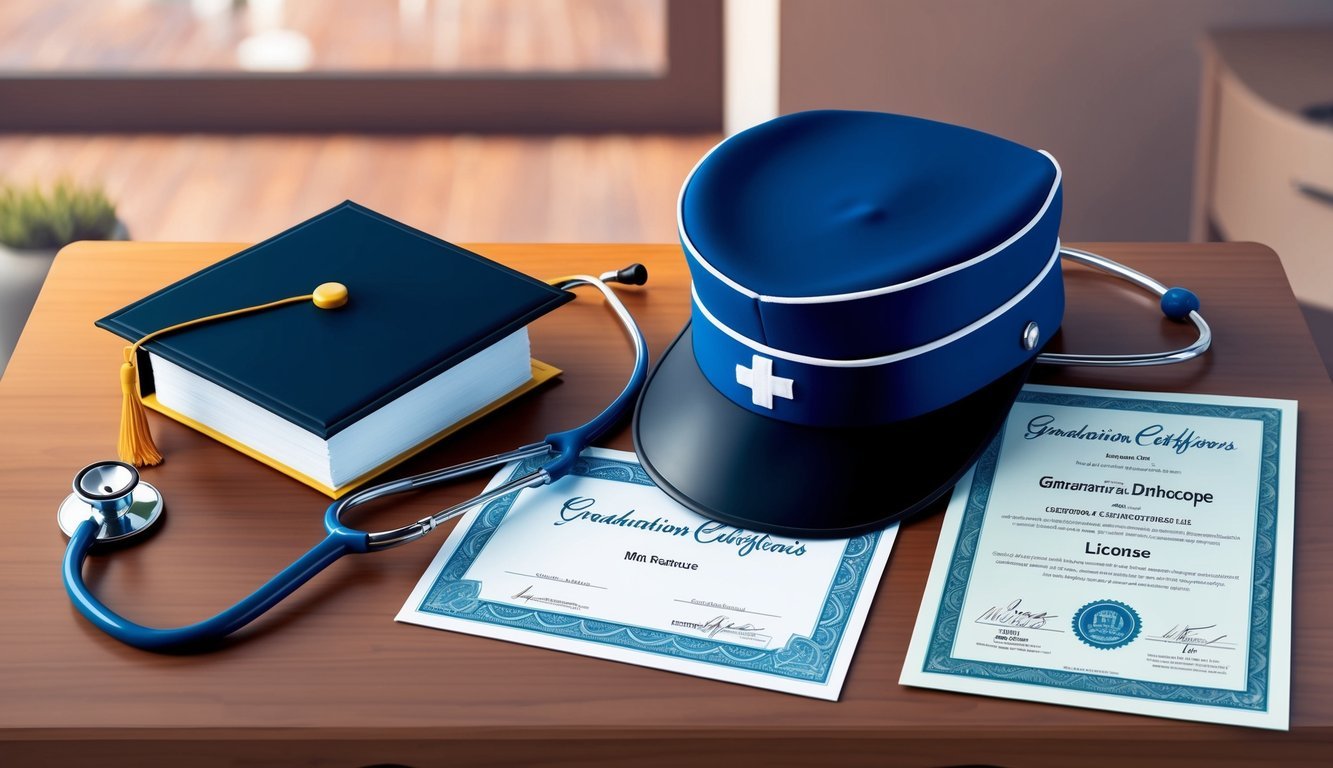Becoming a nurse is a rewarding journey, but age requirements can vary.
You typically need to be at least 18 years old to become a registered nurse.
This minimum age is crucial as it often aligns with the legal requirements for obtaining a nursing license and allows you to enroll in nursing programs designed for adults.
If you are considering a career in nursing, you should be aware that the path involves specific educational steps and licensing exams.
Depending on the program you choose, like an Associate Degree in Nursing (ADN) or a Bachelor of Science in Nursing (BSN), you may need to assess your age vs. the age requirements set by different institutions.
The nursing field offers various specialties and opportunities for growth, making it a dynamic choice for your future.
Key Takeaways
- You need to be at least 18 years old to become a registered nurse.
- Different nursing programs have age and educational requirements.
- Nursing offers numerous career paths and advancement opportunities.
Education Requirements for Registered Nurses

To become a registered nurse (RN), you must meet specific education requirements.
These include high school preparation, various higher education pathways, and understanding nursing degrees.
The right education will set the foundation for your nursing career.
High School Preparation
Before pursuing a nursing degree, it’s essential to complete high school.
Focus on courses in biology, chemistry, and health sciences, as they provide basic knowledge needed in nursing.
Key Skills to Develop:
- Communication: Being able to communicate effectively with patients and healthcare staff.
- Critical Thinking: Analyzing information to make sound decisions in patient care.
Participating in health-related extracurricular activities can also help you gain a better understanding of the nursing field.
Volunteering at hospitals or clinics gives you direct exposure to healthcare environments.
Higher Education Pathways
There are several pathways to obtain the necessary education to become an RN.
The most common options are:
-
Associate Degree in Nursing (ADN): Typically a two-year program offered at community colleges. It prepares you for the nursing licensure exam.
-
Bachelor of Science in Nursing (BSN): A four-year degree offered at universities. This program covers more in-depth nursing topics and can open doors for advanced nursing specialties.
Both degrees require clinical experience as part of the curriculum.
Choose an accredited nursing program to ensure a quality education.
Nursing Degrees Explained
Understanding different nursing degrees is crucial for your career path.
Here’s a breakdown:
| Degree Type | Duration | Description |
|---|---|---|
| ADN | 2 years | Focuses on basic nursing skills; qualifies for the RN exam. Common in community colleges. |
| BSN | 4 years | Offers comprehensive training including management and public health. Preferred for many healthcare employers. |
Both degrees lead to the nursing licensure exam.
After passing, you can also specialize in various nursing fields, including pediatrics, geriatrics, or emergency care.
For more details about nursing degrees, you can visit Nurse.org.
Licensing and Certification

To become a nurse, you must navigate the processes of licensing and certification.
Both steps ensure you meet the necessary standards to provide safe and effective care.
National Council Licensure Examination (NCLEX)
The NCLEX is a critical exam for nursing licensure.
To become a registered nurse (RN), you must pass the NCLEX-RN.
This exam tests your knowledge and skills in various nursing areas.
After completing an accredited nursing program, you can apply to take the NCLEX.
The exam format is computer-based, adjusting in difficulty based on your responses.
You’ll face questions on patient care, pharmacology, and health promotion.
It’s essential to prepare thoroughly, as this exam is a key step in obtaining your state nursing license.
For more details and resources, visit the National Council of State Boards of Nursing.
State Licensure
After passing the NCLEX-RN, your next step is obtaining a state nursing license.
Each state has its own Board of Nursing to regulate the licensing process.
You must apply for licensure in the state where you plan to practice.
The application typically includes submitting proof of education, passing exam results, and background checks.
Some states participate in the Nurse Licensure Compact (NLC), which allows for multistate practice with one license.
This is convenient for nurses who want to work across state lines.
To find your state’s specific requirements, visit the NCSBN’s state licensure page.
Specialty Certifications
Besides a basic nursing license, you can also pursue specialty certifications.
These certifications are granted by organizations like the American Nurses Credentialing Center (ANCC).
They allow you to demonstrate expertise in specific areas of nursing, such as pediatrics, geriatrics, or critical care.
To earn a specialty certification, you often need to fulfill specific education and clinical practice requirements.
Additionally, passing a certification exam is usually required.
Having specialty certifications can enhance your qualifications and improve job prospects.
You can explore certification options through the ANCC’s website for more information on available specialties.
Career Prospects and Employment

The nursing field offers a variety of opportunities across different specialties, with promising job outlooks and competitive wages.
Understanding the job market and potential earnings can help you make informed choices about your nursing career.
Job Market Overview
The job market for nurses remains robust and competitive.
According to the U.S. Bureau of Labor Statistics, there are over 4 million nursing jobs in various roles, such as Registered Nurses (RNs) and nurse practitioners.
The demand for nurses is projected to grow significantly due to an aging population and the need for healthcare services.
Nurses can find opportunities in settings like hospitals, clinics, schools, and public health organizations.
This flexibility allows you to specialize in areas that interest you, such as neonatal or critical care nursing.
As the healthcare industry evolves, the importance of nurses will only increase.
Median Annual Wage
The median annual wage for registered nurses is approximately $75,000, according to recent data.
Your salary may vary based on factors like location, experience, and specialty.
Here’s a quick look at some nursing roles and their average salaries:
| Nursing Role | Average Salary |
|---|---|
| Registered Nurse (RN) | $75,000 |
| Nurse Practitioner | $110,000 |
| Critical Care Nurse | $80,000 |
| Public Health Nurse | $77,000 |
| Neonatal Nurse | $85,000 |
As you gain experience and advance your education, you may access higher-paying positions within nursing.
Growth Areas in Nursing
Several nursing specialties are expected to see significant growth in the coming years.
Nurse practitioners are in high demand, with the profession projected to grow by 28% between 2022 and 2032.
Other key areas include:
- Critical care nursing: Essential in emergency settings, leading to increased demand.
- Public health nursing: Focused on community health, especially post-pandemic.
- Neonatal nursing: Caring for newborns, which has constant demand due to childbirth rates.
Focusing on these specialties can lead to strong job security and fulfilling career paths.
Continuing Education and Advancement

As a nurse, staying current in your field is essential for career growth and maintaining your license.
Continuing education and advanced degrees play significant roles in your professional journey.
Here’s what you need to know.
From RN to BSN
Transitioning from a Registered Nurse (RN) to a Bachelor of Science in Nursing (BSN) is a valuable step.
A BSN degree often opens doors for better job opportunities, leadership roles, and higher salaries.
Many hospitals now require or prefer nurses with a BSN.
Programs like the RN-to-BSN allow you to earn your degree online, making it convenient.
Typically, these programs focus on advanced nursing concepts, leadership, and community health.
Most require you to provide official transcripts from previous nursing education.
Advanced Degrees
For those looking to further their education, pursuing a Master of Science in Nursing (MSN) or a Doctor of Nursing Practice (DNP) is significant.
An MSN allows you to specialize in areas such as nurse practitioner, nurse educator, or clinical nurse leader.
A DNP is the highest practice degree in nursing.
It prepares you for advanced clinical roles or executive positions in healthcare.
Both degrees increase your earning potential and job prospects.
Many programs offer online or part-time options to fit your busy schedule.
Renewal and CEU Requirements
Continuing education units (CEUs) are essential for license renewal.
Most states require nurses to complete a specific number of CEUs every licensing period.
For example, Kentucky requires 30 hours of continuing nursing education for renewal.
Depending on your specialization, you may have additional requirements, such as courses on domestic violence or pediatric care.
You can find CEU courses through professional organizations or accredited schools.
Keeping track of your completed CEUs is crucial, as this documentation is often needed for renewal applications.
Specialized Nursing Fields

Nursing offers various specialized fields that cater to different health care needs.
Understanding these fields helps you choose a path that aligns with your interests and career goals.
Advanced Practice Registered Nurses
Advanced Practice Registered Nurses (APRNs) include roles like Nurse Practitioners (NPs) and Clinical Nurse Specialists (CNS).
APRNs require advanced degrees, such as a Master of Science in Nursing (MSN) or Doctor of Nursing Practice (DNP).
They often provide primary or specialized care, perform assessments, and can prescribe medications.
Common specialties for NPs include pediatrics, geriatrics, and family health.
Certification in these areas usually requires passing a recognized exam.
This advanced training allows APRNs to take on more responsibility in patient care settings, enhancing their career prospects.
Clinical Nursing Specialties
Clinical nursing specialties focus on specific patient populations or medical conditions.
Examples include:
- Medical-Surgical Nursing: Involves general care for adults.
- Emergency Room (ER) Nursing: Addresses critical and urgent care situations.
- Operating Room Nursing: Supports surgical teams in procedures.
- Hospice Nursing: Provides end-of-life care and support for patients and families.
Each specialty may require additional training or certification.
For instance, certified nurses in the Operating Room (CNOR) must pass a certification exam.
These specialties allow you to develop specific skills and knowledge, improving patient care quality.
Non-Clinical Nursing Careers
Non-clinical nursing careers focus on roles outside of direct patient care.
These positions include:
- Nurse Educator: Teaches future nurses in academic settings.
- Nurse Administrator: Manages nursing staff and hospital operations.
- Clinical Research Coordinator: Oversees clinical trials and research studies.
These roles often require advanced education and leadership skills.
While they may not involve hands-on patient care, they are essential for shaping the future of nursing and health care practices.
Exploring these paths can lead to fulfilling opportunities that leverage your nursing background while impacting the larger health community.
Frequently Asked Questions
This section covers important questions related to age requirements in the nursing field.
Understanding the minimum age to start training, work as a Nurse Assistant, and become a Registered Nurse is crucial for your planning.
What is the minimum age requirement to begin nursing training?
To enroll in a nursing program, you typically need to be at least 18 years old.
Some programs may accept students as young as 16 if they are part of a high school program.
At what age can one start working as a Nurse Assistant?
You can begin working as a Nurse Assistant at 16 years old.
This position allows you to gain valuable experience in the healthcare field while pursuing further nursing education.
What are the age requirements for becoming a Registered Nurse?
To become a Registered Nurse, you generally need to be at least 18 years old.
This is required to take the NCLEX-RN exam, which is necessary for licensure.
How many years of study are typically needed to become a Registered Nurse?
It usually takes two to four years to become a Registered Nurse, depending on whether you complete an associate’s or bachelor’s degree program.
Each program has different time commitments.
What is the typical starting age for a career in nursing?
Most individuals start their nursing careers in their early twenties.
However, many people begin nursing programs later in life, so ages can vary widely.
What factors determine the eligible age to begin a nursing career?
Several factors can affect the eligible age, including state regulations and program policies.
Some nursing schools have specific age requirements, while others may consider experience and readiness for the program.
You should check your local requirements for details.

